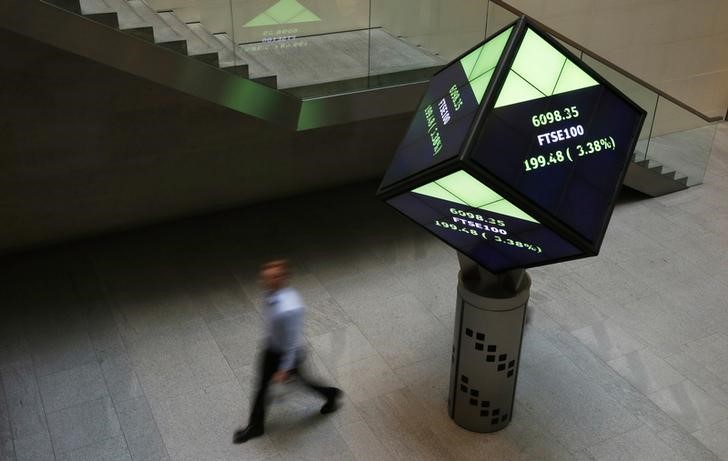By Kit Rees and Atul Prakash
LONDON (Reuters) - Britain's top share index fell back on Monday, pulled lower by weak retail stocks and commodities companies after metals prices touched multi-year lows on concerns over slowing demand in China.
Analysts cited sectoral issues faced by British supermarkets such as margin pressures from discounters Aldi and Lidl and from the need to offer bargains on this week's "Black Friday" shopping day, a relatively new concept in Britain.
"Black Friday is going to be an early test of the strength of UK consumer appetite," Mike Ingram, market analyst at BGC Partners, said.
Morrison (L:MRW) was down 2.6 percent and Sainsbury (L:SBRY) retreated 1.6 percent. Some traders warned of the risk of a rights issue at Tesco (L:TSCO), which fell 3.7 percent.
The blue-chip FTSE 100 index (FTSE) was down 0.5 percent at the close at 6,305.49 points, after recording its best weekly performance in a month last week.
"It's been dragged down primarily ... by the commodity companies, in particular the miners, and that sentiment's transferring over into the wider market," Jonathan Roy, advisory investment manager at Charles Hanover Investments, said.
Shares in BHP Billiton (L:BLT), Glencore (L:GLEN), Anglo American (l:AAL) and Antofagasta (L:ANTO) were all down between 1.2 to 2.3 percent, with the UK mining index (FTNMX1770) retreating 1.1 percent.
Copper hit a new 6-1/2 year low on slowing demand in China and a stronger dollar. Some other metals also traded near multi-year troughs.
"People are very pessimistic about the future outlook for demand for commodities. With China's economic growth slowing, there could be more cost cuttings, mergers and softer prices before we see ultimate price lows," IG analyst Alastair McCaig said.
Shares in oil firms were volatile. After a weak start, they recovered ground following comments from Saudi Arabia that it remained ready to work with other producing and exporting countries to stabilise prices.
However, the sector then reversed the gains to trade mostly in negative territory.
Royal Dutch Shell (L:RDSa) was down 0.5 percent, and BP (L:BP) retreated 0.1 percent.
Security-related stocks outperformed the broader market after Britain decided to boost its anti-terrorism spending by 30 percent. Britain also plans to increase the number of stealth fighter jets it can launch from aircraft carriers over the next decade, Chancellor George Osborne said on Sunday.
"There is every likelihood that the defence sector is going to get a larger piece of financing than expected earlier," IG's McCaig said.
Shares in Rolls Royce (L:RR), a leading provider of defence aero engines and services, rose 3.1 percent, the top gainer in the FTSE 100 index, while BAE Systems (L:BAES) was up 1 percent.

Among mid-cap companies, gambling technology firm Playtech (L:PTEC) slumped almost 9 percent after saying it was terminating its agreement to buy retail forex trading company Plus500 Ltd (L:PLUSP) because it was unlikely to obtain approval for the deal from the UK's Financial Conduct Authority by the end of December.